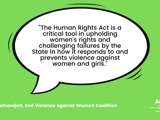Article 2 issues may arise when police do not investigate risks to women’s lives, such as where they aware of domestic violence.
Banaz’s father and uncle killed her for wanting to divorce her violent husband and marry a man from a different ethnic boyfriend. Before she was killed, Banaz had received a number of death threaths and been attacked by her partner, which she reported to the police. Banaz asked for protection but the police did not take her seriously. After Banaz’s death, her sister brought a case against the police for failing to protect her right to life.



